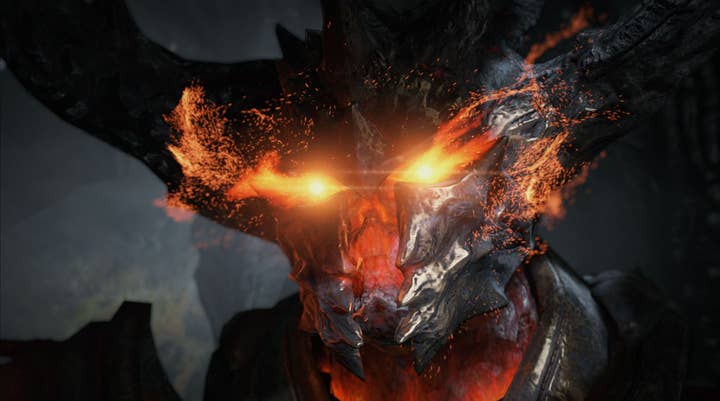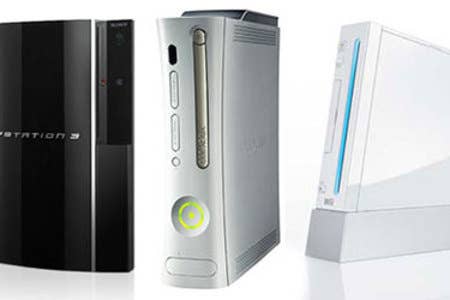Roundtable: Is The Console Cycle Really Too Long?
GamesIndustry International's writers tackle the subject of current-gen dragging on in this week's roundtable
Microsoft launched the Xbox 360 during holiday 2005. The industry is fast approaching seven full years of current generation gaming - an unthinkable number for many game industry executives pining for a new round of hardware to spark the marketplace and enable new intellectual properties to flourish. In fact, a recent conversation between analyst Michael Pachter and EA CEO John Riccitiello indicated that the publishing executive had been anticipating new consoles to hit the market as much as two years ago, and this extended console cycle is partly to blame for EA's stock price woes.
Moreover, tech experts like Square Enix's Julien Merceron have gone on record with GamesIndustry International to note that this generation "has been way too long." He called out Microsoft and Sony for dragging the console cycle into its eigth year as the "biggest mistake they ever made." Merceron believes that many developers who had been waiting for next-gen hardware jumped ship to other platforms, particularly digital ones like iOS, Android, Facebook and Steam, and those game designers may never return to consoles.
So is Merceron right? Have Sony and Microsoft fumbled the ball, or is this actually one of the better things to have happened to the games industry in a long time? GamesIndustry International's global editorial team weighs in.
Rachel Weber
Has this cycle been too long? Look at it is this way, the PlayStation 3 came out in November 2006, about the time Mel Gibson's Apocalypto was released. It was so long ago that man still had a serious career. More relevantly, it was three years later before FarmVille even launched, more than 6 months before anyone even had an iPhone.
The world has changed, and our industry has changed, but the PlayStation 3 and Xbox 360 (which let's not forget is even older) have stayed pretty much the same. Big dusty boxes designed for playing triple-A titles really well, and sort of muddling through when it comes to everything else.

Whole new business models have been conceived, carried and shot out into the birthing pool while Sony and Microsoft have eyed each other (and their accounts) carefully and decided to hold of on a new console for just one more year. Sure, they're working on them in some lab in the secret bunker, and unnamed developers, right now, have games in the works, but still they're holding off.
Maybe they think they can't afford to act, but the truth is they can't afford not to. A new console launch would bring back some love to the brands, allow them to open up to the new business models like free-to-play, and reinvigorate the market and the developers and publishers to create new games, and new franchises. Activision is set to release its eighth Call Of Duty title for this generation; don't tell me those dev teams aren't so desperate for a new machine to play with that they're self harming in the lunch hall.
Ben Strauss
I look at this with a bit of imprudence in that I have more games on this platform than I have ever had with any other. The Xbox 360 and the PS3 (I am ignoring the Wii to an extent without forgetting the fantastic first-party stuff and games like Okami) have brought us some games that I will never forget; Assassin's Creed, Mass Effect, Fallout 3 and New Vegas, Ace Combat and Red Dead Redemption remain in my gaming portfolio. Heck, I still own a PS3 that has Backwards Compatibility for my SOCOM and Ace Combat titles for the PS2.
"Sony and Microsoft's argument is they've turned their consoles into entertainment hubs, but I'm pretty sure I can order a Smart Fridge with Netflix streaming now"
Matt Martin
Sure, most of these games will run on PC and they'll be playable for a good long while, but even with the noticeable tech differences (go play Mass Effect 1 again then pop in Mass Effect 3, you'll see), these games are substantial. This generation really made gaming a common thing for many, many people. I believe we should break past the uncanny valley, and I believe graphics have to improve only slightly...it is more on the tech side of creating less choppy character modeling and framerate issues. The hardware needs to change, yes, that's definitely something that has to happen.
Honestly though, we see a lack of new IP, we see a lot of struggling from all the major players in the industry. A new console line-up could definitely pump some blood into the industry, but just how effective is it going to be? I am very, very hesitant on what the future holds for gaming. I see more F2P, I see more mobile, but most of all I see more platform-agnostic games coming out. A new console cycle? Yes, but with caveats. We have to do more to push platform-agnostic titles and overall social connectivity between games.
Matt Martin
I stopped playing games on my PlayStation 3 about 18 months ago and my Xbox 360 hasn't had much love this year apart from flings with Trials Evolution and Tony Hawk's Pro Skater HD. The truth is I've lost interest in console games this generation. I'm playing on my iPad, I broke out the PSone recently, gave the Vita a second chance and even dabbled in PC gaming. I'm looking for kicks anywhere I can find them.

Sony and Microsoft's argument is they've turned their consoles into entertainment hubs, but I'm pretty sure I can order a Smart Fridge with Netflix streaming now, so I'm not sure that either of them are doing anything I'm interested in. And I doubt I'm the only gamer who's moved on. Look at the crowds around League of Legends or Tribes: Ascend if you want to know where the hardcore is going. Or Auto Club Revolution, and any number of niche titles catering to genre fans on PC, on Android and iOS, on Facebook.
Do I want a new console? Absolutely, whatever format that may be. But I can't help thinking solid hardware under my TV is as old fashioned a concept as set broadcast times for a TV show. It still works and there's a market for it but all the cool kids are off elsewhere jacking entertainment straight into their eyeballs. I still want a new Call of Duty, but I'd rather play some of it for free, and then buy more levels, online maps and perks at my own pace.
Can new consoles offer all of the services and choice we've seen flourish elsewhere in the time it took the Xbox 360 to go from streaming movies to adopting Twitter and offering free baseball updates? I doubt it, so my fear is that while this generation has dragged on (and it has been a drag), by the time new hardware does come around it will be caught on the back foot, struggling to catch up to a constantly evolving market. If they spend the first 12 months on the market trying to catch up and convince gamers to take an interest, how are consoles going to set their own agenda and become relevant again? That's a terrible position to be in.
It's not that there isn't an audience for consoles because there clearly is, but every day the next generation is delayed is another customer lost, their heads turned by new technology, tailored services and better targeted games.
Steve Peterson
All you need to know about the current console generation is contained in one number: 30 percent. That's the approximate drop in retail sales for consoles and console software this year over last year, the fourth straight year of declines. Publishers are releasing fewer titles, and average sales and prices are dropping. It's past time for new consoles to revive sales, if indeed sales can be brought back to the glory days of 2008. The console makers hate having to lose money for years selling new consoles at a loss, so they've held off. This has allowed mobile, social, and downloadable games, particularly free-to-play ones, to build an impressive audience.
"The longer we wait for new consoles, the lower their chances for long-term success as their competition on many fronts continues to rush forward at full speed"
Steve Peterson
New consoles have their biggest challenge ever: Fighting against a vast array of free-to-play games that, one way or another, are making their way to the same screen that console games have been played on. No genre is immune, as a new generation of FPS and RPG games start combining free-to-play with top-notch graphics. Sony has been letting the camel's nose into the tent with Dust 514 and all the SOE MMORPGs. Gamers will be looking for free-to-play games on new consoles, and if they aren't there, that's a huge reason not to buy a new console.
New consoles are going to need to offer compelling new game experiences (either through innovative controller schemes, like the Wii U, or through hugely better graphics) that simply can't be found elsewhere. Additionally, new consoles will probably need to offer an array of entertainment options in order to justify their price tags, and console makers will have to keep prices of the hardware low to create a big enough audience to justify exclusive development. I think most third-party publishers will hesitate to put the majority of their development resources into next-gen consoles; EA and Activision have already shown this. The longer we wait for new consoles, the lower their chances for long-term success as their competition on many fronts continues to rush forward at full speed.
Matt Handrahan
When you spend five days week looking at the games industry from an objective remove, it's easy to miss the moments that require a personal perspective. I was about to write a few paragraphs about iPhones, social networks, free-to-play, and the myriad other sea-changes that have slipped in the back door as this console generation has lumbered along, making our once adored plastic boxes seem irrelevant, but that would be disingenuous.
"The console developers I've talked to are less enthusiastic about the need to re-learn the details of their jobs every five years"
Matt Handrahan
I don't play games on my phone, I certainly don't on Facebook, and every free-to-play game I've ever tried has seemed compromised by its business model. I like single-player games of the sort that are definitely worth £40, and anything less substantial than, say, Fez or Trials Evolution feels like a waste of my time. In short, I love my console, I'll probably love the next one; if these new platforms constitute the brave new world of gaming, I'll be in my front room, doped up on Soma and playing Skyrim.
Wearing my trade journalist hat, I can see the issues a long life-cycle has caused publishers and retailers, but wishing for the prompt arrival of another generation strikes me as confusing the symptom with the disease. One thing's for sure: while the publishers are anxious for new hardware so they can adhere to the self-imposed logic of when to launch new IP, the console developers I've talked to are less enthusiastic about the need to re-learn the details of their jobs every five years. It serves an agenda, yes, but it isn't necessarily in the service of creativity or making better games.
The solution to all of this is many years away - probably in the cloud - but right now I'm left wondering whether new consoles will really provide the leap we're expecting, or just highlight the true nature of the problem.
Wearing my conspiracy theorist hat, I can't shake the feeling that Microsoft and Sony are probably wondering about the same thing.
David Radd
This generation has gone on too long. I distinctly remember having a phone conversation right after Microsoft's 2012 E3 press conference saying "This generation of consoles is done." We're seeing series now get into their fourth major incarnation this year and next, like God of War, Halo and Gears of War. Sequels abounded at the show, reflecting the stagnation pervading the AAA industry right now.
I think this is resulting in retail fatigue - there just isn't the same level of excitement anymore, and it's reflected in the recent NPD reports. Granted, there's serious disruption going on from the digital sphere, but all of the shiny newness has worn off this generation of consoles. While there might be a few spectacular games to send this generation off, for the most part it's just going through the motions until things get refreshed.
To speak to the particular issue of "whether it is good for the industry or not" I think it's been good for Microsoft and Sony, and ultimately they're looking out for number one. Launching consoles is expensive, and I'm sure they've both saved money and made money by delaying as long as possible. As for Riccitiello, the writing was sort of on the wall for an extended console cycle, so I would be shocked if he hadn't accounted for that. And I can't disagree more with Merceron's assertion that if new consoles were coming, the dev teams could have been saved by going to bat on a new console - if they weren't making money now, why would they make money working on an even more expensive platform? Also, there are issues of developer freedom and personal control that reflect the massive defections to the mobile/social space and I'm not sure there's anything the AAA industry could do to change that.
But rightly or wrongly in extending the lifespans, we really need new consoles now.
Mike Williams
Microsoft set the tone by holding off with a new console announcement. The Kinect still has some life left in it and Microsoft is too busy setting up its Windows 8 ecosystem to worry about the launch of another home system. Outside of SmartGlass, E3 felt like Microsoft was playing a waiting game. Subsequent announcements of the Surface tablet, Windows Phone 8, and Office 2013 have shown where the company's focus is in 2012.
"There's the big question of what exactly a new console generation will even offer. Is the jump to Unreal Engine 4 graphics really enough to change the retail slump we see every month with NPD?"
James Brightman
Sony seems increasingly muddled. Move is a non-entity, the Vita is hidden in perpetual shadow, and the PlayStation 3 would be equally forgotten without a strong showing of PlayStation Network games, Beyond, and The Last of Us. The recent acquisition of Gaikai is interesting, but we're probably a ways out from seeing Sony capitalize on it.
Nintendo's Wii U is fun, but feels more like an extension on the existing generation instead of the next generation. Nintendo needs to find the Wii U's story: the reason for Wii players to upgrade and 360/PS3 players to buy a whole new system to play the same games.
PC and mobile markets are where all the change is happening in the industry, with publishers and developers feeling out free-to-play, subscriptions, microtransactions, and cloud-based services. Sony and Microsoft have the networks to capitalize on these new trends, but both are taking a wait-and-see approach when it comes to actual support.
So we stand at the last hurrah of this generation, closing out with a number of titles in March of 2013, a few months before the next E3. It's a shift that needs to happen in 2013, lest investors run scared into the waiting arms of mobile and social network gaming companies. Publishers, developers, and consumers are ready for the next shiny novelty to drive sales, hype, and new IP. Don't keep us waiting.
James Brightman
The issue of whether this cycle has dragged on for too long depends on whose perspective you're coming from. Clearly, for Microsoft and Sony, the length isn't a problem. It's enabled the companies to streamline costs and recoup costs on massively expensive hardware to R&D and manufacture. Sony especially could use a breather before doing it all over again.
The fast-growing sector of the industry encompassing Facebook, mobile and digital PC developers sure doesn't care about how long this cycle is. In fact, as Square Enix's Julien Merceron pointed out, the length of this cycle may very well have spurred on the growth of social and mobile, and as far as I'm concerned, this is a huge boon for gaming on a global scale.
Social and mobile by themselves aren't the cure all for this business, but clearly there's a great desire from the creatives in the industry to break out from the five-year console mold dominated by massive publishers who want to control the IP rights of the precious games that these developers toil to create.

And in terms of the publishers making excuses and holding back on new IP, as Matt Handrahan noted, that's some self-imposed nonsense. It could be argued that now is a great time to launch a new franchise (kudos to Naughty Dog for The Last of Us!). The installed bases are built-up and many gamers are tired of the same old, same old, over and over. And from a technical standpoint these games already look brilliant - especially this late in the cycle.
That's not to say that I don't desire new hardware - but I'm in no rush. And there's also the big question of what exactly a new console generation will even offer. Is the jump to Unreal Engine 4 graphics really enough to change the retail slump we see every month with NPD? The future is digital, and the platform holders better figure out what they're going to do about it, or else they'll cease to exist. Sony's acquisition of Gaikai at least gives me some hope.

